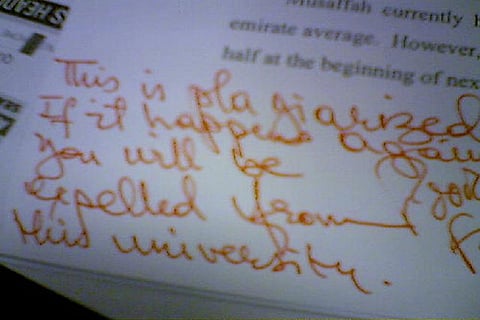

Taking serious view of the rampant plagiarism in academic research works, the University Grants Commission (UGC) has decided to penalise the students, staff and faculty who have been found guilty of plagiarising others’ work, including their own.
In the past, Vice-Chancellors of Pondicherry University, Chandra Krishnamurthy and Delhi University, Deepak Pental, who were found guilty of plagiarism, were sacked for the crime. There has also been an allegation against University of Hyderabad VC, Podile Appa Rao.
In the wake of this, the UGC released a circular on September 1, informing that they have adapted a ‘zero-tolerance policy’ against plagiarism and have set three levels of plagiarism, based on the plagiarism percentage.
In Level 1: (Similarities of 10%- 40 %): Staff/ faculty would be asked to withdraw their manuscript and would not be allowed to publish any work for a minimum of one year. For plagiarism above 40%-60%, besides not allowing to publish any work for a minimum of two years, and denying increment for a year, they would also be not allowed to supervise any student for two years.
For plagiarism above 60%, they would be denied an increment for two successive years, and also would be not allowed to supervise any student for three years.
Similarly, for students, in the first level (10%-40%), the student would not be given any mark/credit and would be asked to submit the revised script within six months. For similarities of 40%-60%, the student would have to submit the revised script after one year, not exceeding 18 months.
For similarities above 60%, the registration of the student for that course will be cancelled.
Further there is a penalty on repeated plagiarism, where the penalty would be higher than his previous penalty.
In case the degree/credit is already obtained by the student, then the student’s degree would be put on abeyance, until decided by the Academic Misconduct Panel or the Plagiarism Disciplinary Authority (PDA).
The UGC committee established to eliminate plagiarism has also recommended the institution of an Academic Misconduct Panel (AMP) and a Plagiarism Disciplinary Authority (PDA).
AMP would be a four-member panel of senior academicians who have a good publication record. The chairman of this panel could be a Dean/Pro-VC/Senior Academician. It is the AMP which will investigate the plagiarism allegations, and then forward it to the PDA—a body chaired by the Head of the Institution.
Further, the committee has also asked the institutions to conduct seminars/workshops for students/researchers to teach them how to attribute sources and how to avoid plagiarism in their research work.
Students will also need to obtain a plagiarism-free certificate from the supervisor before submitting their thesis/dissertation.